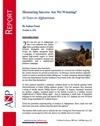US Measure of Success in Afghanistan Is Still Unclear 10 Years Later
Building upon the “Are We Winning?” report series, American Security Project publishes a new study identifying nine metrics to measure the hotly debated progress on the war in Afghanistan
 WASHINGTON D.C., 6 October 2011 – Today the American Security Project (ASP) released a new report titled “Measuring Success: Are We Winning?” which identifies a concrete set of measurements for tracking the progress in the war in Afghanistan 10 years into U.S. involvement in the region. Some of the findings in the report reveal that the opposing parties involved—the Taliban and its allies, and the U.S., NATO, and its allies—are fighting different wars with different outcomes.
WASHINGTON D.C., 6 October 2011 – Today the American Security Project (ASP) released a new report titled “Measuring Success: Are We Winning?” which identifies a concrete set of measurements for tracking the progress in the war in Afghanistan 10 years into U.S. involvement in the region. Some of the findings in the report reveal that the opposing parties involved—the Taliban and its allies, and the U.S., NATO, and its allies—are fighting different wars with different outcomes.
BGen Stephen Cheney, Chief Executive Officer of ASP, said: “Since our first ‘Are We Winning?’ report in 2007, ASP has been measuring the progress in the struggle against al Qaeda and its allies. Our findings have painted a bleak picture with regard to U.S. ‘victory’ in the war on terror. The 2010 report showed a ‘stalemate’ in the war. This report on Afghanistan shows we’re not even tracking and in agreement on the metrics that matter the most. For our national security strategy, this is disappointing. For our servicemen and women, this is simply unacceptable.”
Joshua Foust, ASP Fellow and author of the report, said: “We just can’t say we’re ‘winning’ the war in Afghanistan; there’s no way of saying whether we’re winning or not when the public data about the war is incomplete and, more importantly, keeps changing. The insurgents are fighting a war of disruption and influence, and ISAF is fighting a physical war—after analyzing the strategic objectives of the war, this is clear.”
October 7, 2011 marks 10 years of U.S. involvement in Afghanistan. ASP’s latest report describes the shift in the war as of 2011 and analyzes President Barack Obama’s strategic objectives to determine if we can begin to make claims to “victory” in a war with loosely defined goals and incomplete metrics.
Foustadded: “When we begin to track important, missing metrics like violent rhetoric, childhood literacy and local government accountability—windows into the attitudes of local populations—the U.S. could begin to see the larger picture with regard to our strategic goals in Afghanistan. Agreeing upon a concrete set of metrics is the first step. Until then, we will be left making endless assumptions about who’s winning the war in Afghanistan with our national security integrity hanging in the balance.”
Download the full report here or scroll down read it below:
#END#
Measuring Success: Are We Winning? 10 Years in Afghanistan
About the American Security Project: The American Security Project is a non-profit, bipartisan public policy and research organization dedicated to fostering knowledge and understanding of a range of national security issues, promoting debate about the appropriate use of American power, and cultivating strategic responses to 21st century challenges. For more information, visit www.americansecurityproject.org.






[…] I don’t actually know how to measure success in Afghanistan. But as a practical matter, none of the more obvious metrics seem to support the notion of progress. Violence is up. There is no evidence the insurgency is in […]
[…] We need ‘em. We want ‘em. We ain’t got ‘em. Joshua Foust spoke to the issue of metrics in this paper, and the fact that, 10 years in, there is a distinct lack of metrics whereby we can measure any […]
[…] of quantifiable results, I know that some of you (looking at you, Joshua Foust) would argue that one of the challenges in Afghanistan is measuring success, or, “metrcis.” […]
[…] Foust has recently written on the nearly complete lack of measurable metrics to assess progress in the conflict in Afghanistan, and I’ve written here about the fact that even […]
[…] REPORT: US Measure of Success in Afghanistan Is Still Unclear 10 Years Later […]